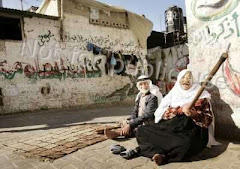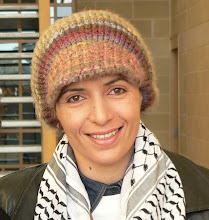Sharon Has a Plan, But It Doesn't Involve Peace or Palestinian Hopes
By Ghada Ageel
Sunday, March 28, 2004; Page B01
ZAHRA, Gaza Strip
The assassination of Sheik Ahmed Yassin last Monday is an attempt by Israeli Prime Minister Ariel Sharon to kill any move for peace in the Middle East.
For the past decade, Yassin had been making proposals which marked big shifts toward a pragmatic solution to the Arab-Israeli conflict. Since the second intifada erupted in September 2000, Yassin had proposed several cease-fires in return for Israel withdrawing from the territories it occupied in 1967 and ending military action against Palestinians. Yassin declared that Hamas accepted a two-state solution, Palestinian and Israeli states existing side by side.
Three weeks before his death, Yassin had announced a plan for Hamas, Yasser Arafat's Fatah and other factions to unite in administering Gaza in the event of a unilateral Israeli withdrawal as proposed by Sharon. This was not in Sharon's interest at all. The late Israeli prime minister Yitzhak Rabin once said he wished to see Gaza drown in the sea; Sharon wants Gaza to drown in the blood of a civil war between Hamas and Fatah.
Yassin had offered a strong base for making peace. The Israeli government's decision to kill Yassin at this moment strengthens the belief among many Palestinians, including me, that Israel simply does not want peace. Every step forward by the Palestinian Authority or political factions such as Hamas is met with a step backward by Sharon. This latest assassination proves that the Israeli government is not ready to talk the language of peace. Under Sharon, Israel talks only the language of power and blood.
Many Palestinians were already convinced of this because of the assassination by Israel of Ismail Abu Shanab, a moderate Hamas leader, last August. Shanab openly accepted a two-state solution. If Israel had wanted to listen to the language of peace, strengthen the moderate camp in Hamas and save the blood of two peoples, it would have kept Abu Shanab alive. It did not.
The bloodshed continues because Sharon's government believes that it can bring Israelis security and peace with a policy of assassination and occupation. It cannot. It believes that these crimes will persuade the resistance groups to abandon their goal of ending the occupation. They will not. On the contrary, Sharon knows that blood demands blood and actions create reactions. He knows that the only likely outcome of Yassin's murder will be to pour fuel on the fire that is already burning and motivate Palestinians further to fight the illegal Israeli occupation of their land. This resistance will in turn produce an Israeli military response, and so the cycle of violence, including the inevitable suicide bombings, will continue without end. But it is important to keep in mind that the occupation causes the suicide bombings, not the other way around.
Sharon wants to distance himself as far as possible from any peace solution that might put pressure on him to make concessions. If he had been interested in peace, he would have followed up on the "road map" for a two-state solution to the conflict, which was accepted by the Palestinians and the international "quartet" (the United States, European Union, United Nations and Russia) but has never been implemented.
Yassin was killed when Israel targeted him with three rockets that mutilated his paralyzed body and the wheelchair in which he was sitting. Later, tens of thousands of ordinary Palestinians filled the streets to express their shock and anger. Even though Israel had targeted him before, no one could quite believe that this had happened -- and in this way.
Yassin was a spiritual leader, not a military target. At 67, he was an old man, paralyzed from the neck down. He was nearly blind and deaf. He was being wheeled home from the mosque after saying the morning prayer. He was an easy target, powerless to run and escape death. How could Sharon consider this crime a victory? The location of Yassin's house was well-known to Israeli forces, and it was no secret that he went every day to the mosque to pray. There was no ingenuity in this operation except that it crossed all the boundaries of humanity and made the tunnel to peace look darker than ever.
Israel has the power in this standoff. If it wanted peace, it could implement it. It is in a position to offer a solution. The Palestinians are only in a position to negotiate in response. The Israelis are proactive. We are reactive because of the imbalance of power. I don't find it so complicated. For the first time, the two camps of Palestinian society, the Islamists (in the form of Hamas) and the nationalists (all the factions of the PLO), have agreed to a two-state solution. The next move is Sharon's. And the international community must offer support for implementing a peace agreement.
It's clear to me that, by killing Yassin, Sharon's government wanted to send a message and to show its maximum power before it withdraws from Gaza. Sharon's message is that if Israel has to withdraw from Gaza, then it leaves as the victor, not as a refugee. Israel lost enough of its reputation withdrawing from south Lebanon. Because Sharon has no strategy for peace, he can only offer this policy of blood.
Like many Palestinians in Gaza, I wonder how the Yassin assassination can be swallowed whole by the international community, particularly the Bush administration, which has refused to criticize the operation. In the eyes of the Palestinians, Arabs and many others in the world, the killing breaks every norm and law, and contravenes every human right we have ever known.
Israel could have arrested Yassin and tried him in court had it wanted to. After all, it invades Gaza almost daily and arrests or kills whomever it wants. Instead it sends Palestinians the message that nothing can stop Israel from doing anything to anyone at any time. No one is immune.
When I saw people of all ages running to join the demonstration last Monday, I realized that, like me, they were weeping for something more than the physical death of Yassin. They were mourning their own victims -- family members, friends and neighbors -- weeping at the brutality of an occupation that has systematically destroyed their livelihoods, weeping over the silence of the international community. I was crying for my cousin, who was paralyzed last October by an Israeli attack, and for the hundreds like him.
The assassination of Yassin was a way to ensure that the violence continues, which will enable Sharon's extremist government to stay in power and continue to avoid any concessions for peace.
Sharon triggered the latest intifada with his visit to the al-Aqsa mosque in 2000. Many Palestinians fear that his government's assassination of Yassin will provoke a new and terrible phase of the intifada, a phase that has no rules except those of revenge. It is usually the Palestinians who are accused of missing the opportunities for peace. This time it is Sharon, and we will all pay the price.
Author's e-mail: g_ageel@yahoo.com
Ghada Ageel, a lifelong resident of Gaza, is a doctoral candidate in Middle East politics through Exeter University in England.
Sunday 28 March 2004
Subscribe to:
Posts (Atom)
Palestinian refugees sit at Khan Younis refugee camp


